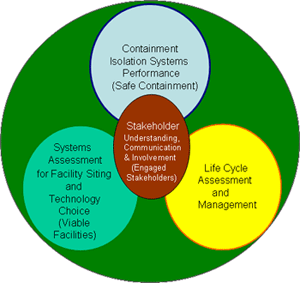![]()
CRESP III Research Focus Areas
CRESP III proposes to address the current absence of nuclear waste management integration through a distinctive set of four interdependent activities, (a) strategic analysis, (b) review, (c) applied research, and (d) education, all organized around a set of four interrelated focus areas.

Focus Area 1: Evaluation of Waste Forms and Contaminant Isolation Systems
Performance. CRESP III will perform coordinated research, strategic assessment and reviews
focused on developing tools and techniques to assess and enhance the integrated
performance of engineered and institutional features of waste containment, land disposal
systems and isolation of residual contamination during and after remediation and near
surface waste disposal.
Focus Area 2: Life-cycle Risk, Cost and Benefit Assessment for Selecting from
Management Options. CRESP III will develop and demonstrate appropriate use of methodologies for
advancing, and communicating methods for comparative life-cycle risk, benefit (human
health and ecological resources) and cost assessment as tools for risk-informed selection
amongst different environmental restoration and nuclear waste management options.
Focus Area 3: Systems Assessment for Siting Processes and Technology
Choices for Future Nuclear Waste Management Facilities.CRESP III will evaluate siting processes and technology choices for nuclear waste
management facilities by examining the potential benefits/limitations of integrated
approaches to resolving nuclear waste challenges by defining/evaluating considerations
for site locations (e.g., impacts of populations, natural resources, transportation) and the
appropriate existing or evolving technologies needed for each type of nuclear waste
management facility (e.g., interim storage, reprocessing); in doing so it will assess the
evolving technical approaches to future fuel cycles, emphasizing the external technical
(e.g., ultimate waste and secondary waste requirements), economic, social and policy
considerations associated with implementation of such facilities.
Focus Area 4: Stakeholder Understanding, Communication and Involvement. CRESP III will assess, recommend and demonstrate approaches to more credibly
incorporate involvement of the diverse stakeholders who can shape decisions to achieve
technically-sound nuclear waste management. The activities for this task shall include, but
not necessarily be limited to carrying out focus groups, surveys, development of
communication tools and educational materials, and carrying out case and organizational
studies to determine whether, and if so how, improved DOE organization, public
involvement practices and procedures, and training would foster confidence in such
approaches. This would include an analysis of relevant successful examples of
stakeholder involvement in nuclear waste management policy or similarly complex
decisions in the United States and other countries.
